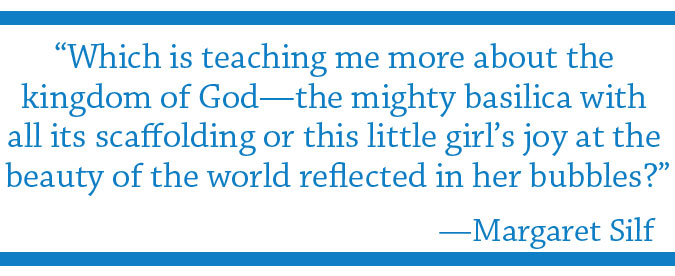 Today let’s explore the Examen through the lens of brief reflections pertaining to each step. The steps in this version of the Examen match what is presented in A Simple, Life-Changing Prayer by Jim Manney.
Today let’s explore the Examen through the lens of brief reflections pertaining to each step. The steps in this version of the Examen match what is presented in A Simple, Life-Changing Prayer by Jim Manney.
Ask God for light.
If we attune ourselves to look and listen, we may find God present within us, all around us, and speaking to us constantly. But if we don’t bother to look, it will seem that there is nothing to be seen. Here’s how the nineteenth-century British poet Elizabeth Barrett Browning wryly described humans, who so often miss what lies plainly in front of us:
Earth’s crammed with heaven,
And every common bush afire with God;
But only he who sees, takes off his shoes—
The rest sit round it and pluck blackberries.
The poet is alluding to the Exodus story in which Moses, encountering God in a burning bush, removes his sandals and hears the call to lead his people out of slavery and into the Promised Land.…Like Moses, we are first of all called to recognize that we live and work and stand in a holy place, “a world charged with the grandeur of God.” We are called, therefore, to the holiness that Rabbi Kushner earlier defined as “being aware that [we] are in the presence of God.”
We are called, further, to freedom from whatever shackles us. For Moses’s people, it was freedom from oppression at the hands of an Egyptian pharaoh; for us, it may be getting over ourselves by breaking free from attachment to money, power, greed, fear, alcohol, sex, pride, prejudice, or any other demons that prevent our becoming our best selves.
—Excerpted from Heroic Living by Chris Lowney
Give thanks.
Our gifts and talents differ, and as a result the harvest produced will differ. But such differences do not make some people better in the eyes of God. Whatever talents or gifts we have are just that—gifts. And gratitude is the only proper response to the reception of gifts.
Gratitude for what we are given runs counter to the competitive nature of our culture. From infancy, we are taught to compare ourselves with others in terms of talent or looks. IQ tests, SAT scores, class rankings—all compel us to compare ourselves with others. In such a culture, the inability to do what others can do and are applauded for can lead to a sense of inferiority. Hence, the man from whom the legion of demons was cast out would, in our culture, tend to think of himself as less valued by Jesus than the apostles who get to follow him. Under such circumstances, the Christian attitude of gratitude and acceptance of the gifts one has does not come easily. We need to pray regularly and often for gratitude to God for who we are.
Perhaps even more important is to pray to know in our bones that we are the apple of God’s eye just as we are. Once, a retreatant felt that Jesus was telling him, “I love no one more than I love you, but I don’t love you more than anyone else.” This was a consoling experience for him and left him feeling very grateful. Moreover, he had no basis for making comparative judgments about his worth in the eyes of Jesus. What a great relief and freedom it would be if we could believe that Jesus makes no comparisons but loves each of us as we are and wants the best for each of us.
—Excerpted from God’s Passionate Desire by William A. Barry, SJ
Review the day.
I was once sitting in a little park in the small town of Loyola in Spain. Behind me was the imposing basilica of St. Ignatius, who was born there. Its edifice at that time was covered in scaffolding and under renovation. In front of me was a small kiosk selling newspapers, chocolate, and other small items.
 A man came along with his small daughter and their dog. The man bought a newspaper for himself and a little container of soap bubbles for his daughter to play with. They sat down beside me. The man was engrossed in his newspaper. The little girl was delightedly blowing bubbles, clearly entranced by the magical colored globe that each bubble formed as it caught the sunlight. The dog jumped up after every bubble and tried to catch it, but as soon as he seized the bubble with his snout, the bubble burst.
A man came along with his small daughter and their dog. The man bought a newspaper for himself and a little container of soap bubbles for his daughter to play with. They sat down beside me. The man was engrossed in his newspaper. The little girl was delightedly blowing bubbles, clearly entranced by the magical colored globe that each bubble formed as it caught the sunlight. The dog jumped up after every bubble and tried to catch it, but as soon as he seized the bubble with his snout, the bubble burst.
I asked myself, “Which is teaching me more about the kingdom of God—the mighty basilica with all its scaffolding or this little girl’s joy at the beauty of the world reflected in her bubbles?” The little dog was a reminder that as soon as we try to take hold of the mystery and pin it down into our own categories, words, and meanings, we destroy it.
If we think we have “got” it, we will lose it.
If we think we have “arrived,” we have gone down a cul-de-sac.
—Excerpted from Simple Faith by Margaret Silf
Face your shortcomings.
We have not always made choices that lead us to praise, honor, and serve God. We have not always acted as if we believe that we are loved. We have not always treated everything in our lives as a gift.
We come to the humbling awareness that we are sinners, that we have often been ungrateful and unfaithful. We have failed to respond to God’s offer of love by failing to love God and love our neighbor. Sin is the failure to bother to love. Sin is not simply the things we do but also the things we fail to do. Ignatius traces all this to a lack of gratitude—failure to recognize everything as a gift to be cherished, fostered, and shared. For Ignatius, ingratitude is the greatest sin and the root of all sin. It is, in the end, the failure to love as God has loved us.
This realization leads us to sorrow. Ignatius invites us to pray for sorrow and shame, for a deep interior knowledge of our sinfulness, of the disorder in our lives, and of our ingratitude and lack of response to God’s offer of life. This sorrow leads us to contrition and repentance—a turning toward God, whom we have offended. We realize that we have distanced ourselves from the one we most desire.
We are sinners, but we are forgiven. The two are connected. Only when we claim our sinfulness and stand in sorrow before God can we truly experience God’s mercy. We are loved sinners. God loves us even when we are sinners. Only when we know the depth of our sin do we know the depth of God’s mercy. We are not as good as we thought, but we are much more loved than we ever imagined.
—Excerpted from Discovering Your Dream by Gerald M. Fagin, SJ
Look toward the day to come.
We need to act wisely, as God would have us act. The question to ask yourself is “What will I do today?” I have a long to-do list written on a sheet of paper that lies next to my keyboard. I work in two different offices, and I carry the list around with me. (I haven’t put it in my phone yet—that’s one of the items on the list.) My list is a mixture of personal and professional tasks, small errands and big projects, the urgent and the postponable, the practical and the dreamy. This list is the future. Most days I go through the list and select the tasks that I will do today. That’s what we do in the fifth step of the daily Examen. We narrow things down. The future becomes today.
Today isn’t going to be what you expect. Your boss will give you a new project; people who have promised to get back to you won’t do it; someone you haven’t heard from in months will call or drop in; you’ll open an e-mail and discover that you have to stop what you’re doing and tend to a problem immediately; your spouse will be delayed at work, disrupting dinner and the evening plans; your sister will call, asking for a big favor. You can’t control this pandemonium, but you do have influence over it. There are some steps you can take to get more closely aligned to Christ, who is in it all.
—Excerpted from A Simple, Life-Changing Prayer by Jim Manney
Download a prayer card with the steps of the Examen here.
Join in 31 Days with St. Ignatius with today’s entry, The Spiritual Meaning of Balance. Follow along everyday this month here and on social media #31DayswithIgnatius.

Each time I see a self-help or leadership type book, I am always amazed as to how what they are selling/encouraging was discussed/written hundreds of years prior.
This is emotional intelligence in many facets.
The examen is the prayer par excellence for me.
I pray it on my daily walk in the woods near Paris.The finding of God in all things needs practice at first but then it gets a lot easier.I do it in four steps request, relish , review , resolve.
One of the great insights of Ignatius which Jim manney and Mark Thibodeaux stress is the role of gratitude and ingratitude being the root of all other sins .
The emotional life is a place filled with material to bring us closer to God and we learn in the reviews to observe rather than think.
It is similar to the very beginning of the Ignatian adventure when he noticed his feelings after reading the two different books ..the books on saints and the chivalrous literature.
All in a prayer to be taught and shared with others
interesting…thanks
Love it. The examen. The same yet ever rich and ever different. I do it at the start of the day. Putting myself in the Presence of God. Asking for the grace of wisdom for the day, guidance in my actions and decisions and clarity. i then ask “What was I most grateful for yesterday?” I review yesterday and single out one or two experiences where I felt most grateful. I stay quiet before Him, listenling. Amazing what He shows me. Then after brief moments of silence and listening, I ask, “What am I least grateful for yesterday?” Then I stay still listening. I pin down the event. Again I stand before Him realizing more and more “I love because He loved me first.” I embrace myself saying, “I am totally, completely, perfectly loved.” I allow myself to feel his embrace. Be still and know that I am God. In His embrace I close with the Suscipe. Take and receive my liberty, my memory…give me only Your love and your grace,and that will be enough for me. I end my morning examen eager and ready to face the one or two meetings or client calls ahead of me in the morning or in the afteernoon. That’s my examen at the start of each day moving me forward to experiences His surprises in the day ahead. And my, He gives lots”
Your words are treasures. God lives and gives through you. I am grateful.